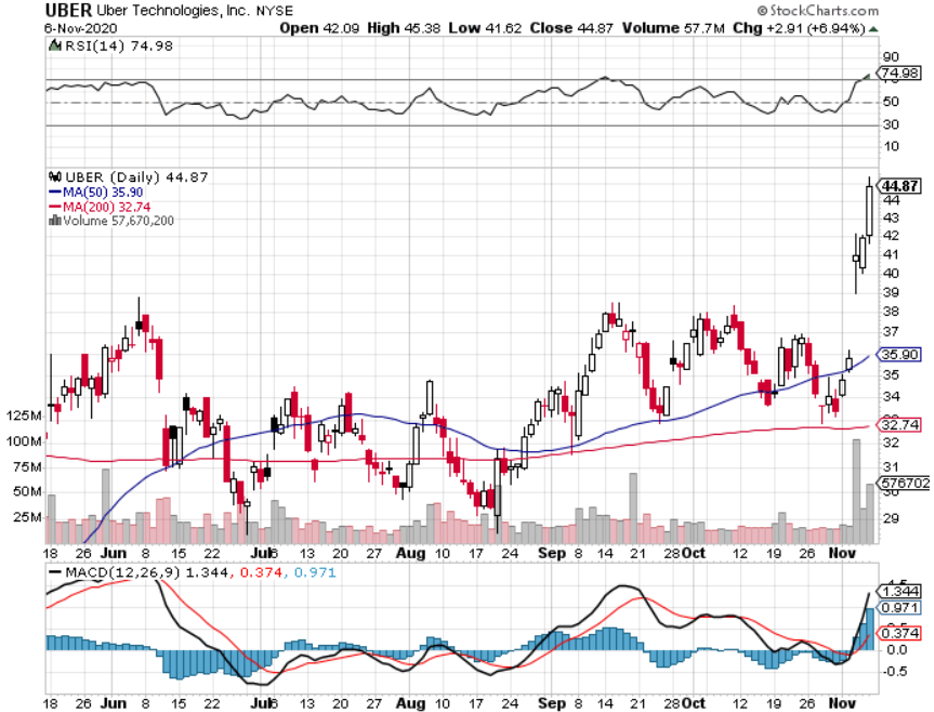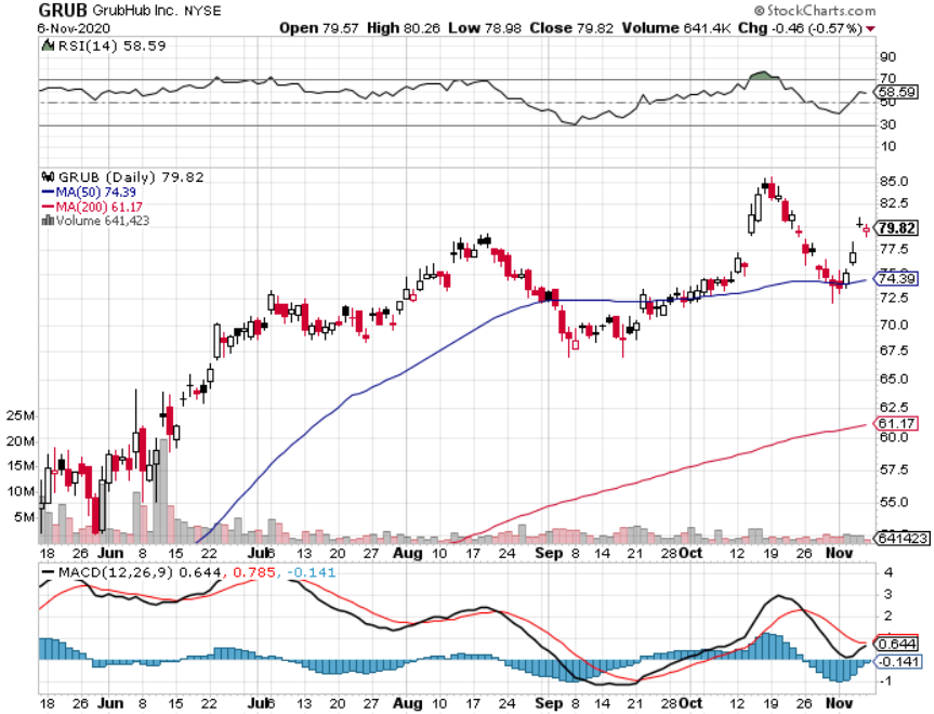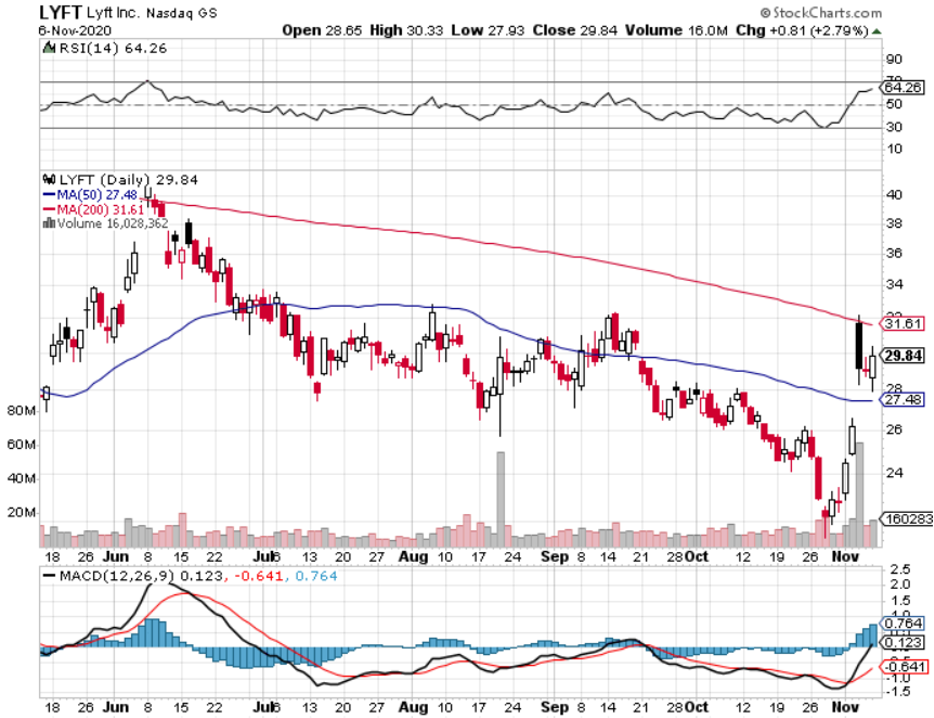Uber Back from Purgatory
The most impacted tech company in 2020 is most likely ridesharing company Uber and is highly likely to become the new “buy the dip” tech stock.
I’ll tell you why and how they managed to turn it around.
Foundationally, two important data points from their earnings report have to be total revenue declining 18% year-over-year and delivery revenue growing 125% year-over-year.
The good news is that delivering food is turning out to be a monumental growth engine and the bad news is that the core business is hamstrung by the current conditions stemming from the global health crisis.
Even with their core business declining, Uber benefits from a silver lining of the macroeconomy recovering from summer lows and this will follow through into its ride-sharing operations.
The initial recovery from terrible to bad is usually the greatest in terms of percentages similar to recent quarterly GDP numbers.
I am definitely observing positive movement in Uber’s direction, especially as consumers feel less comfortable taking mass transit during the pandemic.
This development is clearly much better than a mass lockdown where Uber is unable to deliver on any rideshare volume whatsoever.
Management has also indicated that the overall environment is starting to considerably improve over the coming quarters with Q2 marking a clear trough in volumes and fundamentals.
Another potential tailwind is that the consumer element is becoming commonplace across cities both in the US and internationally and their preference will steer them away from mass transportation given health concerns.
This could result in an incremental demand driver for ridesharing vendors over the next few quarters and beyond.
Structurally, Uber will get to the other end of the health crisis intact and as a healthy corporation.
That speaks volumes compared to corporates floundering in damaged industries like energy and retail.
But the elephant in the room was finally addressed with the passage of California’s Proposition 22, a measure that exempts it, along with rival Lyft (LYFT) and businesses like Instacart and GrubHub (GRUB), from having to pay drivers like in-house employees.
This is the feather in their cap they needed to become the newest buy the dip tech stock because it essentially means they won’t have to pay drivers much to drive for Uber instead of doling out proper employment contracts.
The passage of the proposition legitimizes Uber’s business model at a time where the global economic environment is precarious, and we could be walking straight into legislative gridlock and an inadequate fiscal stimulus package.
This obviously means putting less dollars in consumers’ pockets to pay for Uber Eats and Uber rideshares.
This was essentially an existential issue for Uber in the state of California and without a win, Uber and Lyft threatened to pull out of California entirely.
This has happened before like in Austin, Texas, which Uber deserted in 2016 after the city passed a measure calling for stricter background checks and fingerprinting for drivers.
Fortunately for Uber, Texas State Legislature overruled Austin, and Uber and Lyft returned to the city.
The current ballot count is 58.4% in favor of Prop 22 and 41.6% in opposition meaning Californian citizens overwhelmingly voted to pass this measure.
Californians, no doubt, were scared to lose their cheap way of getting around the suburban sprawl that is California.
Even if Uber’s company creates a traffic snarl of drivers meaninglessly idling around for more rides – that is a moot point right now.
Gig workers will continue to be classified as independent contractors in the state.
It also essentially makes these gig companies exempt from AB-5, the gig worker bill that went into law at the beginning of the year that forces gig companies to pay sub-contractors like regular workers.
That is off the table and a massive win for Uber.
On the back of this legislative success, Uber will now take this win and go after other states to pass similar types of legislation.
This political template for future anti-labor, corporate law-making is pro-capital to the extreme extent of the law for better or mostly worse in my eyes if you aren’t a corporate shareholder.
This perhaps could open up all corporations in California to never pay health or social security benefits in the future to employees.
If Uber doesn’t have to, then why does Google, Facebook, or Apple need to share the burden of paying for medical and social security benefits?
Labor groups are considering potentially lobbying the newly elected Biden administration’s Department of Labor for improved federal laws for worker classification.
Biden has pledged to narrow economic inequalities and Uber’s win could be in his crosshairs because the result is a massive setback for labor laws in California and potentially around the United States.
Intervention would take some balls by the Biden administration and the most likely scenario is him giving Uber a pass.
Gig Workers Rising, a campaign supporting and educating app and platform workers, had this to say, “Billionaire corporations just hijacked the ballot measure system in California by spending millions to mislead voters. The victory of Prop 22, the most expensive ballot measure in U.S. history, is a loss for our democracy that could open the door to other attempts by corporations to write their own laws.”
Yes, this is terrible for Uber drivers but highly positive for shareholders of Uber’s stock.
The cost of doing business is effectively passed on to the guy at the bottom – sub-contracted drivers.
Like it or not, it will be enshrined into Californian law and this makes serious inroads to Uber’s business model actually becoming profitable which has been the big knock on this company.
At the very minimum, this will give a stop-gap measure for the 10 or so years Uber needs to get to autonomous driving technology where they can just never pay the driver again.
Not only does the path to autonomous driving technology look optimistic, but the excess liquidity circulating in the market effectively means that zombie companies will be funded infinitely.
Although not a zombie company, Uber has really had a hard time making up the numbers to prove a viable path to sustainability and that basically doesn’t matter anymore.
The existential threat is now out of the window and with several structural tailwinds powering Uber, the stock and the company have never had a brighter future and any medium-sized pullback should be bought.
This one is going higher.






